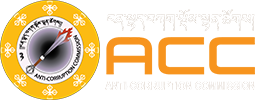JOINT ENGAGEMENT PROTOCOL TO UNDERTAKE SYSTEM STUDIES DURING INVESTIGATION
1. Introduction
Prevention is an important tool in fighting corruption and is an integral part of the Anti-Corruption Commission’s (ACC) Three-pronged Strategy as stipulated under Section 25 (b) (c) (d) and (e) of the Anti-Corruption Act of Bhutan 2011.
Amongst the many prevention strategies, system study is one effective and long-term approaches to fighting corruption.
As specified under section 25 (b) of Anti-Corruption Act of Bhutan (ACAB) 2011, the Commission shall examine the practices, procedures and systems of public or private sector entities to facilitate the discovery of offences under
Chapter 4 of ACAB 2011 and to secure the revision of such practices, procedures or systems which in the opinion of the Commission may be conducive to corruption.
To achieve any organizational goal, there should be proper systems consisting of laws, rules, procedures and processes. Such systems should be regularly reviewed in order to ensure appropriateness and effectiveness. In many instances, corruption is attributable to system lapses, inappropriate systems, inadequate systems, and non-compliance with systems. System study delves deeper into the practices, systems and work procedures of agencies, identify weak links in governance systems conducive to corrupt practices and provide systemic recommendations to strengthen systems and minimize corruption opportunities.
System studies have been grouped under two categories: reactive system study and proactive system study. In this context, reactive system study refers to study during investigation, and proactive refers to the rest. Undertaking system study, both reactive and proactive isacore function of Prevention Division (PD) under the Department of Prevention and Education (DoPE).
2. Reactive System Study
A clean system is not a natural state of affairs. Corruption comes from weakness of human nature – greed, temptation, the desire to amass wealth or to obtain business through unfair means. Even with harsh penalties, corruption cannot be eradicated completely. Corruption problems cannot be addressed only through detection and punishment as an aftermath of investigation. It can also be fundamentally tackled through system strengthening and instituting corruption control measures in the agencies.
Corruption prevention recommendations and advice is one of the outcomes of investigations. Investigations provide insight into how or why the corrupt practices occurred. In turn this insight provides the ground work for improving systems, policies and procedures within the agencies/organizations. Recognizing the high value of lessons learnt in the course of an investigation into corrupt practices, systemic recommendations are shared. System correction recommendations as a result of investigations are the most effective form of recommendation. Acceptability of recommendations by agencies is assured since they would not have reasons to resist.
While proactive system study is carried out by Research Division under DoPE, reactive system study in the form of highlighting system flaws and providing recommendation for improvement is carried out by Department of Investigation (DoI) and PD. Though system study both reactive and proactive is a core function of PD, PD has been playing minimal role in undertaking actual reactive system studies. So far, the reactive system studies and systemic recommendations emanating from the investigationhave beencarried out by the respective investigating teams from DoI. No officer from PD wasinvolved in the actual system study. PD’s role is only in sharing the systemic recommendations propounded by DoI and following up with its implementation with the respective agencies thereafter. Therefore, PD’s understanding and knowledge of systemic issues discovered during theinvestigation is only superficial.
System study being one importantmandate of PD, the need was felt for PD to be more actively involved in undertaking actual reactive system study. The involvement of PD in the actual system study in cases having systemic issues would bring greater impacts in closing systemic loopholes through providing effective systemic recommendations and timely follow up on its implementations besides building the capacity of the officers in PD. It will enable PD to gain in-depth understanding of systemic issues in various organizations and this knowledge and understanding will in turn help the division in framing effective preventive programs and activities. Having PD to undertake the system study would also help in giving a more multi-disciplinary approach to investigation making the effort of combating corruption more wholesome and effective.
Therefore, it is important to find some ways of how PD could be more actively involved in the reactive system studies. While there are several ways of undertaking system study by PDas practiced in other anti-corruption agencies, three possible options relevant in our context was looked into, each with its own pros and cons as follows:
